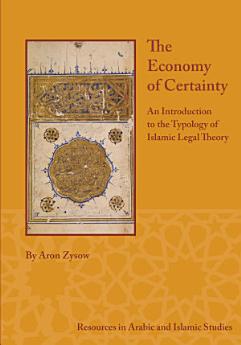The Economy of Certainty: An Introduction to the Typology of Islamic Legal Theory
Aron Zysow
Jun 2014 · Resources in Arabic and Islamic Studies Book 2 · Lockwood Press
Ebook
360
Pages
family_home
Eligible
info
reportRatings and reviews aren’t verified Learn More
About this ebook
Aron Zysow's 1984 Ph.D. dissertation, "The Economy of Certainty," remains the most important, compelling, and intellectually ambitious treatment of Islamic legal theory (usul al-fiqh) in Western scholarship to date. It continues to be widely read and cited, and remains unsurpassed in its incisive analysis of the most fundamental assumptions of Islamic legal thought. Zysow argues that the great dividing line in Islamic legal thought is between those legal theories that require certainty in every detail of the law and those that will admit probability. The latter were historically dominant and include the leading legal schools that have survived to our own day. Zahirism and, for much of its history, Twelver Shi'ism, are examples of the former. The well-known dispute regarding the legitimacy of juridical analogy is only one feature of this fundamental epistemological division, since probability can enter the law in the process of authenticating prophetic traditions and in the interpretation of the revealed texts, as well as through analogy. The notion of consensus in Islamic legal theory functioned to reintroduce some measure of certainty into the law by identifying one of the competing probable solutions as correct. Consequently consensus has only a reduced role, if any, in those systems that reject probability. Another, more radical, means of regaining certainty was the doctrine that regarded the legal reasoning of all qualified jurists on matters of probability as infallible. The development of legal theories of both types, that of Zahirism no less than that of Hanafism, was to a large extent shaped by theology and, most significantly, by Mu'tazilism, and subsequently by Ash'arism and Maturidism. Zysow's important work is published here in full, for the first time, with updated references and some further reflections by the author.
About the author
Aron Zysow received his A.B. (Classics), Ph.D. (Islamic Studies), and J.D. from Harvard. From 2000 to 2005 he served as Research Associate for the Islamic Legal Studies Program at Harvard Law School. Before that he taught Arabic and Islamic Studies at the University of Washington in Seattle and Washington University in St. Louis and commercial law at Baruch College, City University of New York. Prior to his academic career he worked as an attorney in New York City. His main academic interests are Islamic law, particularly legal theory, and theology. He is a former fellow of The Institute for the Transregional Study of the Contemporary Middle East, North Africa and Central Asia (TRI) at Princeton University, where he also taught in the Department of Near Eastern Studies.
Rate this ebook
Tell us what you think.
Reading information
Smartphones and tablets
Install the Google Play Books app for Android and iPad/iPhone. It syncs automatically with your account and allows you to read online or offline wherever you are.
Laptops and computers
You can listen to audiobooks purchased on Google Play using your computer's web browser.
eReaders and other devices
To read on e-ink devices like Kobo eReaders, you'll need to download a file and transfer it to your device. Follow the detailed Help Center instructions to transfer the files to supported eReaders.







